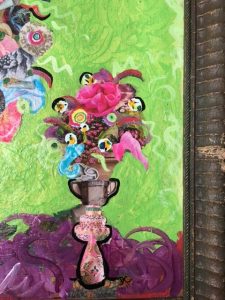Wife Material, my new novel, started as a memoir before it became a work of fiction. I wrote it because I could not- not write it. In the beginning, I tried to expose the dark side of a religious sect – the one in which I spent my childhood. In the end, I’d made up whole scenes from scratch. I made up characters that fit, emotionally, with the true life events in my memory. I made up events that fit, emotionally, with the culture that shaped me. And pretty soon, the made-up story felt more accurate than my facts-only version.
But what compelled me to put my life on paper in the first place? Why go to all the trouble, take a decade, weep over pages of trauma, keep a notebook handy at all times, put paper drafts in the freezer for years (in case of a house fire), sit at the computer thousands of hours, subject myself to critical feedback and revision and rejection and multiple rounds of editing?
Because. My history exists for a reason. And getting it into a readable story form allowed me to turn nasty experiences into art. Someone reads my shameful pit of despair and says, That happened to me too. Then, suddenly, I’ve reached a person with my words. I have an art piece instead of a bad memory. A whole room full of sculptures instead of twenty-three years of mistakes and trouble.
My dad hurt me, physically and emotionally and spiritually. As I put him in context, story him as a suffering person who acted out, I see myself as an innocent child – not a worthless object or a bad thing, undeserving of protection or nurturing. I remember the moment I realized this shift, as a stared at a page in my journal where the handwriting convicted him of child abuse. I held that journal out away from my body. I threw it to the floor. I put it in the trash. Then I got it out, rewrote the event in the form of scene, on the computer. Now there was distance between me the person, and that true-life trauma that left me drenched in shame and loathing for so many years.
I suggest Life Writing for my trauma therapy clients. Writing allows us to lay claim to our experiences in ways we can’t otherwise. It forces us to make sense of events that were confusing. It re-orders scattered clumps of memory and draws them into meaningful wholes. It takes trauma and externalizes it, there on the page, so it moves outside us.
Life Writing also facilitates the process of EMDR therapy and adds to our overall health and well-being.
Especially with child abuse, your story informs you as it informs the world. How you were handled as a child lives in your body. Putting that experience on paper, seeing it in words, in black and white, sharing it with trusted others, even fictionalizing it, helps to get the horror out of you and into a piece of intellectual property. That creative property helps you see yourself as a character in a story – one who deserves empathy and love.
Call me if you’d like to learn more about writing and healing from trauma, EMDR therapy, or how writing improves our mental health.
[dacta]

Like to Subscribe?
Get notified when Deborah shares new ideas, art, and creative health information for you.
You have Successfully Subscribed!
We respect your privacy. No information will be shared.